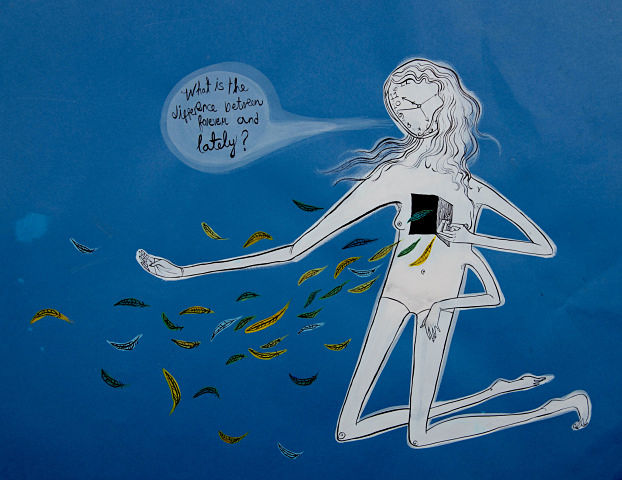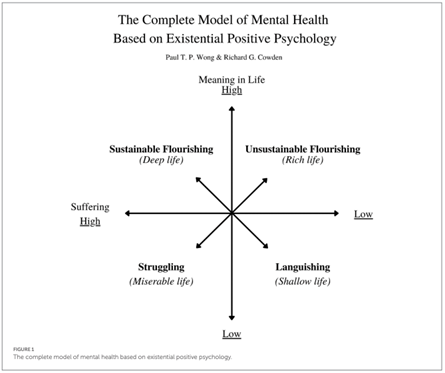“How could we find happiness when suffering is an escapable part of life?”
“What is the point of striving when all life ends in death?”
During current times of manifold crises, complex questions such as these are a common part of the human experience, and such existential dread and uncertainty are linked to increased mental distress. Existentialist positive psychology (EPP or PP2.0) offers a framework to grapple with these types of complicated yet common human questions.
The article, published by Canadian clinical psychologist and writer Paul T.P. Wong, along with psychotherapist Don Laird, introduces EPP as an alternative framework for conceptualizing psychological distress that runs counter to the dominant biomedical model.
Authors critique the medical model, particularly the Diagnostic and Statistical Manual of Mental Disorders (DSM), for its disease-oriented approach that inherently positions psychological suffering as an individual problem necessitating intervention at the individual level. Authors assert that this model inadvertently blames the individual, failing to recognize the relational and social aspects of their distress. Further, authors claim that the DSM may pathologize normal human responses to current life circumstances, such as existential anxiety and loneliness in response to the COVID-19 pandemic, and, in doing so, misguide the direction of treatment.
“Mental health is more than an individual issue. It is also interpersonal, societal, cultural, and transcendental. Furthermore, it is not helpful to pathologize normal human reactions to complex and difficult life situations. Therefore, a new narrative of mental illness is needed to reduce the stigma by recognizing that other factors, such as nature, society, and fate, are often beyond individual control and can negatively impact one’s mental health,” write the researchers, laying the groundwork and rationale for EPP.
In their article, Wong and Laird set out to define the core principles of EPP, present illustrative case examples to showcase the use of EPP in treatment via Integrative Meaning Therapy and present a new conceptual framework for studying “well-being” rooted in EPP tenants.

The EPP framework draws upon Dr. Wong’s decades of research on suffering, clinical work as a psychotherapist, and the integration of Western and ancient Chinese cultural values. At its core, EPP emphasizes the universality of suffering and the importance of enduring hardship as a component of well-being and happiness. The authors critique predominant Western worldviews that encourage individuals to focus solely on the positives and ignore the negatives to “enjoy life” and achieve happiness.
Authors assert that suffering, pain, and existential concerns (particularly those related to loneliness and mortality) should be honored as inevitable, core parts of the human experience rather than ignored or repressed, as is commonly encouraged by the pervasive culture of toxic positivity.
The authors advocate for future research on well-being to study the inter-dependency of happiness and suffering. Through this framework, well-being should be understood as a process rather than an outcome:
“[Well-being is] the process of navigating the dialectical interactions between Yin-Yang to discover the adaptive balance of the middle way between positives and negatives.”
Authors write that this viewpoint, deeply rooted in Buddhist tradition, is not new but rather an extension of generations of writing and practice:
“The need to embrace suffering and transform it into something meaningful is a recurrent theme in philosophy, literature, and religion. EPP simply extends existential psychology into a new science of suffering by developing a comprehensive account of the effects of suffering and its complex interactions with well-being.”
The authors present two clinical case examples to demonstrate how mental distress can be conceptualized as a normal human response to one or a combination of the four kinds of suffering: physical suffering, psychological suffering, social and interpersonal suffering, and existential suffering. They propose that psychological disorders can be understood as difficulties in coping with and enduring these various forms of suffering. Reasons for these difficulties may include the inability of one to meet their basic needs or personal deficiencies in finding meaning in life, regulating emotions, or building relationships.
Integrative Meaning Therapy (IMT) is an approach to treating psychological distress through an EPP framework. In IMT, the psychotherapist supports their client in cultivating a “meaning-mindset” (e.g., finding meaning in everyday life activities) and practicing meaning-centered coping (e.g., finding lessons in suffering, learning acceptance, praying).
Overall, the goal of IMT is to support an individual in achieving well-being through learning to manage three core components of the human experience: (1) how to live a fulfilling life, (2) how to transform suffering into something meaningful, and (3) how to relate and connect with other people in a multicultural society. While Wong and Laird recommend IMT specifically, they highlight how meaning-making is a common factor across many different types of therapies. As a practical guide, they offer ten characteristics of a meaning-centered psychotherapist:
- Holds a hopeful view of every client and treats them with respect and dignity.
- Makes effective use of the self—the therapist is the therapy.
- Help clients move toward both healing and well-being simultaneously.
- Sees both the big picture and situational problems.
- Integrates different modalities around the central construct of meaning.
- Integrates the art and science of meaningful living.
- Considers meaning as both personally and socially constructed.
- Empower clients to take personal responsibility to develop their potentials.
- Equips clients with skills in making the right decision and effective coping.
- Takes a holistic view of well-being, including spiritual well-being.
To conclude their article, Wong and Laird present a new model of total mental health that integrates the importance of suffering and meaning. The model is illustrated as two intersecting arrows representing continuums of being: one from low to high meaning and the second from low to high suffering.
The four quadrants created by the intersecting lines represent four states of being, with “sustainable flourishing” (high meaning and high suffering) defined as the best possible life resulting from one being able to find meaning amidst their pain.
 This viewpoint article adds to a growing body of work by researchers and advocates calling upon Western psychiatry to abandon the biomedical model of mental health. Existentialism and existential positive psychology offer a much-needed paradigm shift that can help people understand their suffering as more than just a symptom of psychopathology.
This viewpoint article adds to a growing body of work by researchers and advocates calling upon Western psychiatry to abandon the biomedical model of mental health. Existentialism and existential positive psychology offer a much-needed paradigm shift that can help people understand their suffering as more than just a symptom of psychopathology.
The authors close with a message of hope to the reader:
“We have made the case that suffering is necessary for sustainable well-being and flourishing. If we focus only on the negative events in our lives, we will be swallowed up by the black hole of depression and anger. However, if we focus on the meaning of suffering and learn to see light or be the light in the darkest hours through practicing hope, love, and faith, we will be strengthened and blessed.”
****
Wong, P. T., & Laird, D. (2023). Varieties of suffering in the clinical setting: re-envisioning mental health beyond the medical model. Frontiers in Psychology, 14, 1155845. (Link)















“if we focus on the meaning of suffering and learn to see light or be the light in the darkest hours through practicing hope, love, and faith, we will be strengthened and blessed.”
I completely agree, and it’s a tragic shame so many psychologists betrayed their clients, by going off, only believing in the “invalid” DSM.
The pendulum – that is psychology/psychiatry – once again needs to swing in psychology’s direction (if either “profession” even deserves to survive, since it’s highly unlikely I would ever trust in any psychologist ever again).
And, as one who hopefully is now in the “sustainable flourishing” category, albeit dealing with rather concerning care giving issues for loved ones, I definitely agree getting rid of the DSM is needed.
And IMT sounds like a rather common sense, rational approach. Especially when compared to the insanity of the “blame the patient,” iatrogenic illnesses describing, DSM “bible” of psychiatric and psychological stigmatizations.
Report comment
Just a caveat, AFIU, buddhism intends to provide understanding and wisdom. Not explanations, the path, the way in buddhism is a personal one, and it cannot be explained to someone else. It’s an insight, not knowledge even if it leads to wisdom. A revelation more than a discovery.
But sounds positive as an approach…
Report comment
Of course, to aim high philosophically speaking, is always a good thing. You are more likely to hit the marks of “faith, hope, love and blessing” if you take the philosophical physics into account. But let us not forget the physics of biological matter and their unfortunate effects on our bodies and our attendant psychology.
Report comment
Thank you for your excellent post summarizing the article by Wong and Laird. I agree with the articles argument regarding the enduring significance and relevance of an existential approach to the inescapable suffering within the human condition and the potential for suffering to be transformative. The contribution which a serious examination of the inherent suffering of human life makes to critiquing the dominance of a medical model is also an important point. Seeing those who are suffering as experiencing an expected and natural response to difficult life conditions and loss challenges the over-emphasis on pathology.
The issue of suffering has long been a focus of my own academic and clinical work. Like the article, I have found that the subject of suffering has been largely neglected by psychology and medicine. This is both ironic and troubling given that the issue of suffering is the pre-eminent concern for those who seek care. Existential philosophy and psychology is indeed an exception to this, as noted in the article. In addition, transpersonal psychology, particularly based on its integration of religious and spiritual traditions, offers a valuable framework for understanding and working with those who are suffering.
I believe the neglect of the issue of suffering by psychology and medicine is in part a reflection of the natural tendency of human beings to respond to threats to their existence with denial and resistance. This can be placed within the framework of the fight-or-flight response which is triggered when individuals are confronted by conditions that pose a threat to their existence that exceed their ability to manage or control. Recognizing this proclivity is an important part of working with individuals who are suffering. This is especially the case when the loss they have encountered is of such a magnitude that challenges their worldview and thus their very sense of who they are. In existential thought, this is called the boundary experience. It produces a sense of uncanniness along with feelings of derealization and depersonalization. I agree with the observation made by Frank and Frank in their book, “Persuasion and Healing,” that it is a threat to one’s worldview that is the principal reason for individuals seeking therapy. The dilemma posed by meeting suffering with resistance is that it is ultimately self-defeating. In other words, people end up suffering because they are suffering. This is why an important step in the process of healing is to help individuals come to accept the inevitability of a certain degree of suffering in life and finding a means of using that suffering to promote positive transformation.
While the research article cited in this post makes a number of very valuable observations, I believe there is one significant area it neglects. While the article asserts that the meaning of suffering is both personally and socially constructed and correctly observes that we live in a culture of toxic positivity, the focus is mostly on how suffering is experienced and impacts an individual. While the article includes a recognition that human beings must be understood within multiple contexts, it fails to take into account fully the social causes of suffering. By which I mean the role which discrimination, exploitation, oppression, and violence plays in causing suffering. As is observed, pathologizing is a way of blaming the victim. That is why it is important to help those who are suffering to distinguish between the suffering that is an inescapable part of being human from suffering inflicted on them by various forms of social injustice. These two forms of suffering require very different responses. Examining suffering from a principally individual perspective also fails to take into account the various means used by society to obscure the role of oppression, violence, exploitation, and discrimination in inflicting suffering. In other words, there are powerful forces at work, rooted in neoliberal ideology, that mask suffering or that inculcate attitudes toward suffering that serve to maintain the status quo and secure the power of the privileged. People in our society are bombarded with messages that all suffering is bad and that when one is suffering, every effort must be made to avoid and, if possible, banish it. An example is the message that suffering can be avoided or ameliorated by means of consuming products that add to the profits of those motivated by greed. Or that if one is willing to surrendering one’s rights and freedoms to powerful individuals they can protect you from suffering. These socially based defenses which capitalize on our innate tendency to resist suffering are forms of mystification that serve economic and political purposes. They also need to be a part of working with those who are suffering. I discuss this at length in my book, Embracing Disillusionment: Achieving Liberation through the Demystification of Suffering.
Report comment
That’s a really good point. If I understood correctly there is suffering that is somehow unavoidable, and one that is not. One caused by actions and omissions, and one that somehow is intrinsic to human existance. Like childbirth pain…
Report comment
Yes, that is correct. One way the unavoidable suffering has been explained is by the Buddha who spoke of illness, growing old, and death as clear examples. The existential psychologist, Viktor Frankl, describes it as the tragic triad. That is, we are finite, fallible, and mortal. These forms of suffering are clearly painful, difficult, and frightening. However, they are not subject to moral condemnation. That is because they “just are”. Where the moral dimension becomes relevant is when the cause of suffering is due to human actions freely chosen. In such cases we can say that the suffering caused is evil because it was the result of choices and subsequent actions taken by an individual or individuals and rooted in a absence of compassion and injustice. Because the consequences of those actions is treating others inhumanely and destructive, they can be judged as evil. One of the reasons that it is important to distinguish between these two forms of suffering is because the distinction is often confused as a means of denying that evil has been done or as a means of trying to justify forms of injustice. One example is blaming people who are poor for their misfortune because they are lazy and other vices. This lie is clearly exposed when we consider how many children are born into poverty and often have significant obstacles to moving out of that state. Another example is seeing the devastation done to groups of individuals who are vulnerable in a natural disaster and calling it an “act of God”. This explanation fails to address the role which human actions play in increasing the likelihood of such disasters and that certain individuals are more at risk of dying or being injured, again the poor, the aged, the disabled. These are all forms of blaming the victim which is unfortunately all to common in our country due to its exaggerating personal responsibility and failing to recognize the significant role that broader economic, political, social, and environmental factors play in causing suffering.
Report comment
“… in a absence of compassion and injustice …” and ignorance. Which at least I think in tibetan buddhism is the root of all evil.
Great answer, thanks 🙂
Report comment
The authors’ 10-step guide sounds like a rehash of a 12-step program.
Report comment
It did sound a little like that to me… somehow, weird, hahaha
Report comment